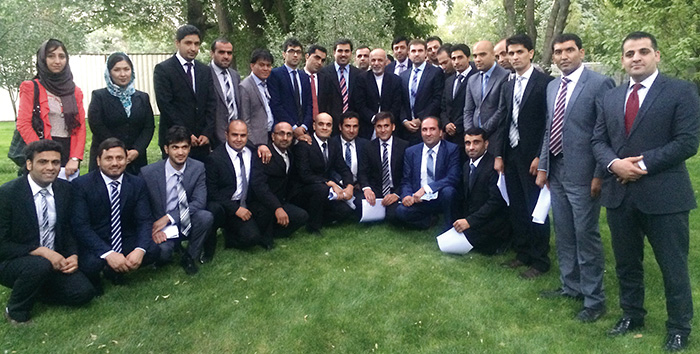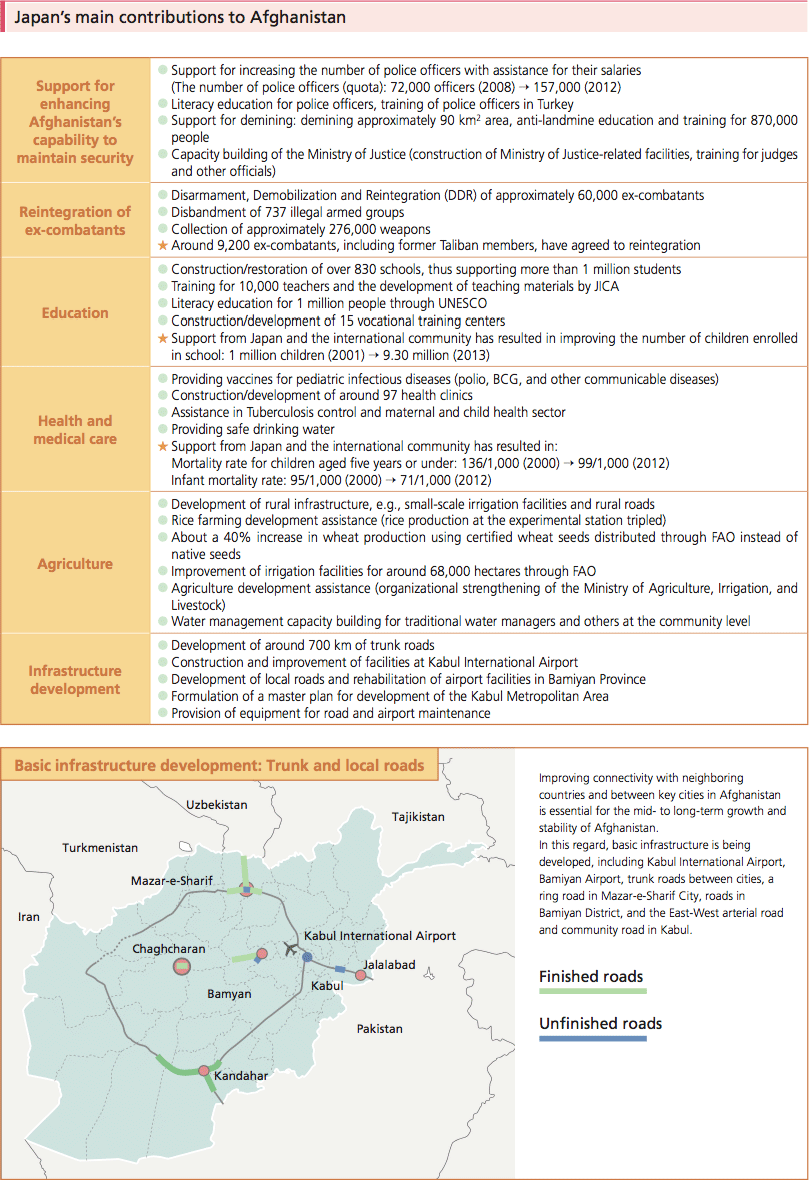(2) Assistance to Afghanistan and Pakistan
The prolonged unstable situation in Afghanistan and Pakistan is a challenge, not only for these countries and the surrounding region, but also for the entire world. The international community, including Japan, supports Afghanistan to prevent the country from stepping back to a hotbed for terrorism. Ensuring stability in Afghanistan is critical, especially in light of the inauguration of a new government following its presidential election and the withdrawn of the International Security Assistance Force (ISAF) in 2014. Cooperation by Pakistan is essential for stability in Afghanistan, including in relation to reconciliation with Taliban, and is key to peace and stability in the region and the international community.
< Japan's Efforts >
| Afghanistan
Japan has consistently extended assistance to Afghanistan. Japan's assistance to Afghanistan since October 2001 totals approximately $5.4 billion.
Japan and Afghanistan jointly held the Tokyo Conference on Afghanistan on July 8, 2012. The conference, attended by representatives of about 80 countries and international organizations, issued an outcome document titled, “The Tokyo Declaration.” At the conference, the Tokyo Mutual Accountability Framework (TMAF) was established to clarify the mutual commitment between Afghanistan and the international community for the sustainable development of Afghanistan and to regularly monitor and review the commitment. On that occasion Japan announced that it would provide up to approximately $3 billion of assistance to Afghanistan in about five years from 2012 in the fields of development and enhancement of security capabilities. Since 2012, Japan has extended approximately $2.1 billion of assistance to Afghanistan.
In April 2014, presidential and provincial council elections were conducted in Afghanistan. With voter turnout greatly exceeding that of the previous elections, the country's first democratic transfer of power was realized. Japan, in coordination with the international community, extended a grant aid of ¥1.639 billion in order to support the election process by the Afghan government.
While there was progress in the TMAF commitments made by the Afghan government, including the holding of elections, further efforts are needed in other areas, such as efforts to combat corruption.

Afghanistan's new president, Dr. Ashraf Ghani (center, not wearing a tie), welcoming young civil servants who came back after studying in Japan. (Photo: JICA)
| Afghanistan
Invitation Program on Natural Disasters and Disaster Risk Reduction Systems
Technical Cooperation Project (February 2 – 12, 2014)

Participants confirming the effect of brace, which is designed to be used for anti-seismic structures, at the Disaster Reduction and Human Renovation Institution in Kobe, Hyogo Prefecture. (Photo: JICA)
Afghanistan is a country that suffers from frequent natural disasters. It suffers from diverse disasters almost every year, such as earthquakes, floods, droughts, landslide disasters and cold waves, affecting 400,000 people per year. The Government of Afghanistan formulated the National Disaster Management Plan and the New Policy and Strategy for Disaster Management in 2003, and established the Afghanistan National Disaster Management Authority (ANDMA), which is in charge of developing disaster management mechanisms.
In addition, under the “Istanbul Process,” which aims to promote regional cooperation between Afghanistan and its neighboring countries, Japan has been coordinating with other members of the international community in its support to Afghanistan in the area of disaster management.
Against this background, Japan invited 13 disaster management officials from Afghanistan in February 2014. The purpose of this invitation program was to contribute to the development of disaster management mechanisms in Afghanistan by allowing these officials to learn about the disaster risk reduction policies and measures of Japan and other neighboring countries of Afghanistan and to build networks with related organizations in these countries. Four disaster management officials from Kazakhstan, Turkey, and Pakistan also visited Japan as instructors.
The participating officials from Afghanistan and other neighboring countries developed a close relationship and mutual understanding by learning about disaster risk reduction together. One of the participants from Afghanistan says “Through this program, I have learned a lot about disaster risk reduction not only in Japan but also in three neighboring countries. Pakistan particularly seems to have many programs that we can utilize, such as disaster risk reduction-related human resources development methods and emergency action planning. We would like to strengthen coordination with these neighboring countries to receive various supports in future.”
It is hoped that Afghanistan will deepen cooperation with its neighboring countries and the international community and promote disaster risk reduction measures, in order to reduce the number of people affected by natural disasters as much as possible.

| Pakistan
Japan has been actively engaged in assisting Pakistan since Pakistan announced its intention to fight against terrorism in cooperation with the international community following the terrorist attacks in the United States in 2001. In April 2009, Japan hosted the Pakistan Donors Conference and pledged assistance of up to $1 billion to Pakistan in two years, which has been steadily implemented.(Note 20) In 2014, Japan extended a ¥5 billion ODA loan to support energy sector reform by Pakistan.
To contribute to the improvement of security situation in Pakistan, Japan has provided cooperation for education, health, vocational training, and other projects in the Pakistan-Afghanistan border area, and supported Pakistan's efforts to bring stability to people's lives. In 2013, Japan extended assistance of approximately ¥2 billion for the improvement of airport security at major international airports in Pakistan, including for the installation of X-ray inspection equipment. Through such efforts, Japan supports the counter terrorism measures in Pakistan.
- Note 20: Includes aid for flooding in FY2010
